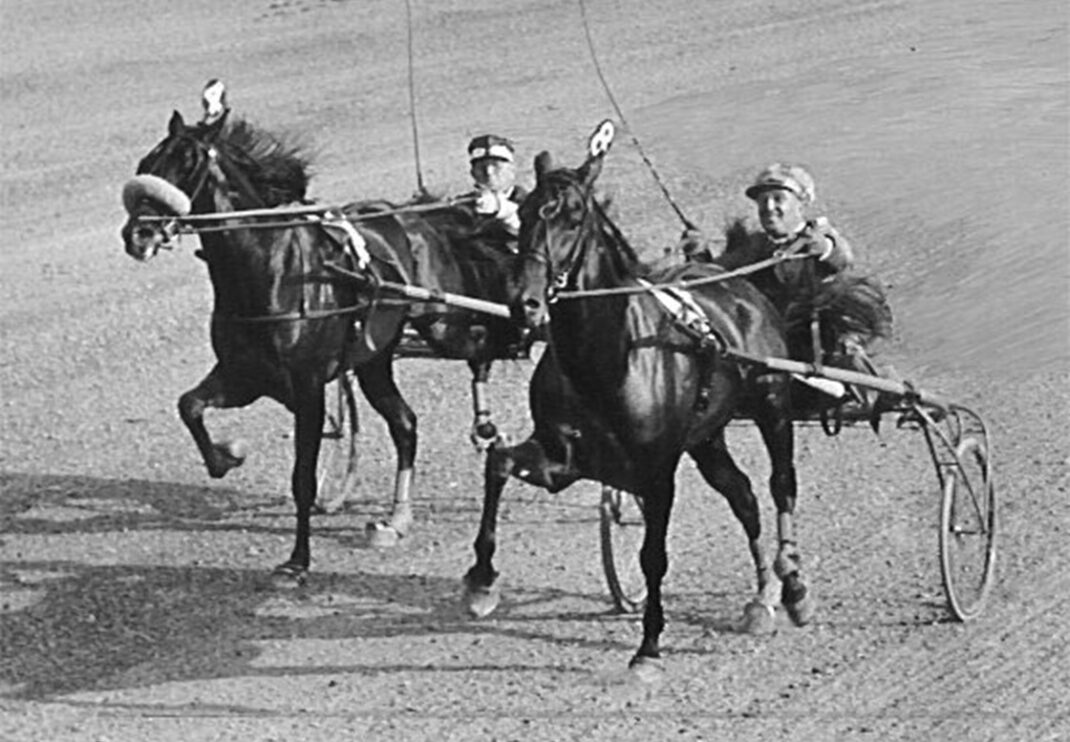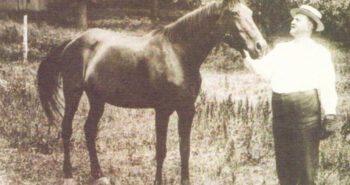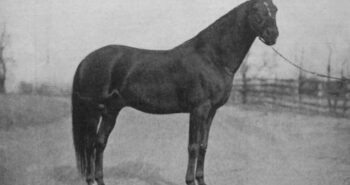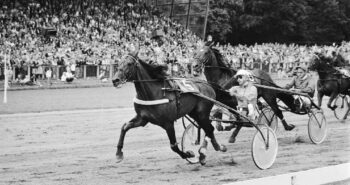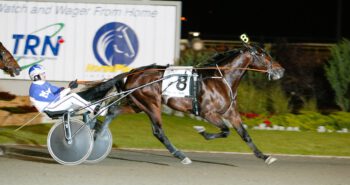In 1938, Good Time Stable owner William Cane sold McLin, shortly after renamed McLin Hanover, just one week prior to the Hambletonian. In 1946 he repeated that by selling Chestertown to Walter E Smith of Los Angeles, president of the Western Harness Racing Association, just three days prior to the biggest race. Both horses, of course, went on to win the Hambletonian.
Chestertown was a slight favorite in the 1946 Hambletonian on the back of him defeating Victory Song in the National Stake a week prior. It was a fast rise to the top for a colt that didn’t even race at 2 – and oddly enough, Victory Song also only raced once at 2. Bred by Harry Knight’s Almahurst Farm, he was sold for $6,500 at the Tattersalls Sale to William H Cane’s Good Time Stable.
A last minute deal
While Deanna, Westfield Girl, Bombs Away and others were building up their reputation at two, Chestertown spent the time grazing and training on E Roland Harriman’s Arden Stud Farm as he was not considered good enough yet. Entering the fray as a three-year-old, Chestertown failed to impress in this first two starts at Goshen’s Historic Track, but then started to make a name for himself by winning three races in Maine – including the National, where he defeated Victory Song in two straight heats.
Sold to Walter E Smith and Robert J Newman for $40,000 on Aug 5, just three days prior to the Hambletonian (the deal had been agreed a few days earlier, but was not finalized until three days prior to the big race), his new owners then turned his new colt over to Tom Berry literally days before the race. The 69-year-old Berry, originally from Britain, had won the 1930 Hambletonian with the exceptional Hanover’s Bertha, and had plenty of experience.
A clean sweep
The 1946 Hambletonian was marked a new era as it was the first time the Phillips starting gate was used. On the track it didn’t become the massive duel many hoped for. After finishing a length behind Victory Song, who won in 2:03 (1.15,8) in the first heat, Chestertown won the second and third heats relatively easy in 2:02 1/2 and 2:03 1/4 (1.16,1 and 1.16,6). In the second heat, Victory Song jumped offstride. In the third and final heat, Victory Song was head-to-head with Chestertown with one-eighth to go, but the challenger faded and Smith’s colt pulled away to win by roughly one length, the first Californian win in the Hambletonian. By taking home $28,047, the colt also repaid quite a chunky of the, at the time, hefty price tag.
After the Hambletonian, Victory Song’s driver Sep Palin blamed Del Miller for the loss. Miller’s horse Don Scott had hit Victory Song’s wheel in the second heat and caused him to break stride, and Palin also felt Miller was helping Berry and Chestertown in the race. Delvin Miller, a straight shooter, responded by calling Palin a cry-baby.
And how did Cane feel about selling Chestertown? He didn’t cry over spilt milk; “I work on the theory that no man is going to go broke taking profits. I won stakes money on Chestertown’s successful racing in my colors. I made a further profit on the difference between $40,000 and $6,500 when I sold the colt. I certainly was happy that the next owner of Chestertown made some money on him, too.”
Chestertown also won the Matron Stakes but finished second, to Victory Song, in the Kentucky Futurity. He proved one of the better aged trotters, though he really stood no chance when Rodney, Victory Song – the sound and good version – and others took part.
Didn’t follow up
In March 1947, the four-year-old Chestertown was in California to prepare for his seasonal debut there when he came down with a serious case of pneumonia and lung congestion and was, according to reports, running a fever of 106 F (41 C). The colt took well to the medication and recovered relatively quickly. The colt had a relapse less than a month later but recovered and made his 1948 debut at Bay Meadows in San Mateo on May 31. He was the big favorite, but lost to Sky Raider, a full brother to Greyhound, who won in 2:06 (1.18,3).
It generally set the stage for the rest of his career. Although he did put in some good performances here and there, Chestertown was not a dominant aged trotter. He lost most of his races to Victory Song, though he got the better of the latter in 1948 when winning the first heat of the $10,000 Grand Circuit Trotting Derby. Later that summer he set a world record in Roosevelt’s two-mile trot, trotting the distance in 4:19.2 (1.20,6) and lowering Peter Manning’s 4:23 (1.21,7) record which had stood since 1928.
Toward the end of his career, Smith sold Chestertown to co-owner Robert J Newman of New Orleans. Chestertown retired in 1950 as the fourth-biggest money-winning trotter of all time with career earnings of $108,864. He stood stud at the Village Farm in Langhorne, Pennsylvania for one season, and then moved to Bonnie Brae Farm in Ohio. He had very little impact at stud in the US, and in 1958 he was exported to Italy. Chestertown didn’t fare much better as a stallion in his new country either, and almost immediately fell out of favor with Italian breeders.
chestertown
Brown colt born in Nicholasville, KY in 1943. Died in Italy in 1964.
Volomite – Phoebe Hanover (Mr McElwyn)
4,T2:00.2 (1.14,8) – $108,864
Breeder: Harry Knight/Almahurst Farm
Owners: Almahurst Farm – Good Time Stable – Walter E Smith and Robert J Newman – and others
Trainers: Harry Whitney, Tom Berry
Drivers: Harry Whitney, Don Huff, Tom Berry, Neil Boardman, Sander Russell and others
Groom: Howard “Shorty” Knowlton

